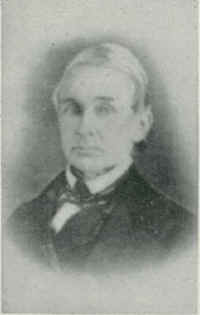|
|
||
|
Wells Bushnell
| ||
|
The fourth pastor [of the Presbyterian Church in Meadville] was Rev. Wells Bushnell . He was ordained and installed June 22, 1826. The pastoral relation was dissolved June 26, 1833.
History of the Erie Presbytery, 1868 Click to view the source for this material.
Wells Bushnell served as third pastor of the First Presbyterian Church in New Castle, from 1839 to 1854.
Fiftieth Anniversary of the Dedication of the Church, 1896-1946, First Presbyterian Church, New Castle
Rev. Welles Bushnell. Born in Hartford,
Conn., in April, 1799, he came in early life to the city of Pittsburgh,
where, at the age of seventeen, he united with the First Presbyterian
Church under the Rev. Dr. Herron. His college studies were pursued at
Jefferson, and his theological at Princeton, and he was licensed by the
Presbytery of, New Brunswick about 1825. He was called to the church of
Meadville, and ordained over it June 22d, 1826. He continued pastor of
that charge until June 26th, 1833, when his relation was dissolved at
his own request, in order that he might go as a missionary to the Wea
Indians under the auspices of the "Western Board of Foreign
Missions." He went to that then remote post (in Kansas), and
entered upon missionary work, but his strength was not equal to the
arduous duties, and, after laboring a year and a-half, he returned to
New Albany, Indiana, where his parents then resided. After a little
rest, he supplied for a time the First Church, Louisville, Ky., and was
urged to take a new enterprise there. But his opinions on the subject of
slavery forbade his residence in a slave State, and he accepted a call
to Greensburg, Indiana, where he labored a year and a-half, when he
returned to Pittsburgh, and, after a brief service of the churches of
Grand Run and Cambridge, in Crawford county, he was installed over this
church of New Castle in April, 1839. Here he continued to labor
faithfully and successfully for fifteen years and a-half.
At the close of this time troubles arose, and one of those unhappy church controversies, which seem to be chronic in some congregations; the pastoral tie was severed and he soon after cast in his lot with the Free Church, an organization which grew out of dissatisfaction with what the brethren who composed the organization supposed to be the attitude of the General Assembly of 1845, on the subject of Slavery. One of the earliest organized of the congregations of the Free Church was what is now the Second Church of our city, which was largely composed of persons who withdrew from the First Church, including two of the elders. The history of the troubles connected with Mr. Bushnell's removal could be pretty fully gathered from old records of the Session and the congregation; but the recital, though it might be painfully interesting, could do no good, and I refrain from attempting it. I believe that few, if any, doubted the sincerity of Mr. Bushnell's convictions, the purity of his motives, the earnestness and depth of his piety and of his desire to do good. But there were those who differed with him, no doubt, as sincerely, and the result was, he left this field; united with the Free Church, and served its churches of Mount Jackson and New Bedford until the close of his earthly labors, July 16, 1863. History of Lawrence County, 1877, pages 148-149
Rev. Wells Bushnell... had been a missionary to the Wea Indians in Kansas, then a remote post, which he had been obliged to leave on account of failing health. He was installed in the [First Presbyterian] church at New Castle in April, 1839, and labored there for fifteen years and a half. Toward the close of his pastorate troubles arose in the congregation owing to the dissatisfaction of some of the brethren with the attitude of the General Assembly on the subject of slavery, and a part of the membership withdrew and organized the Free Church, one of the earliest congregations of which afterwards became the Second Church. With this organization Mr. Bushnell united and was afterwards pastor of its churches at Mt. Jackson and New Bedford, until the close of his earthly labors, July 16, 1863.
Twentieth Century History of New Castle and Lawrence County, 1908, page 207
| ||
 Crawford County Clergy
Crawford County Clergy